
26 minute read
Inclusion
Launching inclusive tours of Gladiators – A Cemetery of Secrets
During the summer of 2019 we presented Gladiators - A Cemetery of Secrets at Callendar House, attracting over 5,000 visitors to see fascinating exhibits on loan from the Jorvik Centre, York. The exhibition included Roman artefacts dating back to the second century including the skeletal remains of six men, believed to be gladiators, alongside photographs and illustrations of the excavations in York. We wanted to make sure the exhibition was inclusive and accessible so we invited artist Tessa Asquith Lamb to help interpret Gladiators for visually impaired people, including clients from the Forth Valley Sensory Centre. Tessa is an expert in this area, having developed descriptive tours for the National Galleries of Scotland and more recently at the V&A Dundee. Her tour of Gladiators included an overview of the exhibition, followed by detailed descriptions and discussions with the group around each exhibit. An important part of the tour included sound and handling objects, such as tiny clay figures, tools, pottery fragments and pieces of mosaic tile. These interactive opportunities provided a rich sensory experience and very direct engagement with the exhibition, and participant feedback was overwhelmingly positive. Inclusive tours are now becoming part of our supporting activity offer for the temporary exhibitions programme at Callendar House, and we look forward to continuing to widen access to cultural and heritage experiences through innovation and partnership working.
Advertisement
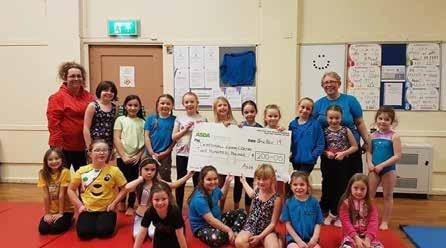
Supporting Tamfourhill’s Community Champion
Falkirk Community Trust has supported Community Champion Lynne Boslem every step of the way in delivering her vision for gymnastics for Tamfourhill. Our Community Sport Hub Officer, Martin Wylie, began working with Lynne very early in the inception of Camelon Community Sport Hub; an innovative area-based model supported by the Trust. Lynne embodies two of our key objectives: Meeting Customer Needs and Growing our Leadership and Community Development Capacity. She is passionate about her local area and she makes sure that those most in need have every opportunity to participate. In particular, Lynne has helped identify what people within the Tamfourhill area value, with a focus on activities for younger people. The Trust has funded Lynne to achieve her UK Coaching Level 1 and Level 2 in gymnastics, and we’ve funded the purchase of around £12,000 worth of gymnastic equipment for the Centre. Our Sports Development team has also mentored Lynne, nurturing her confidence as well as enhancing her coaching knowledge. The Tamfourhill area has gone from no gymnastics provision to having two very successful classes for primary and secondary age pupils. At the turn of 2020, Lynne introduced an adult session and a toddler class, and there are now 42 participants in the programme. Lynne is a truly inspirational example of a Community Champion and we are proud to support her!
POW Camp, Castle Rankine, Denny.
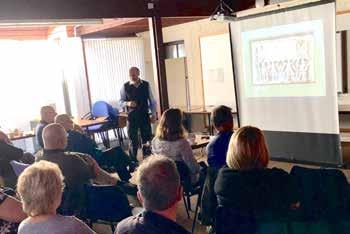
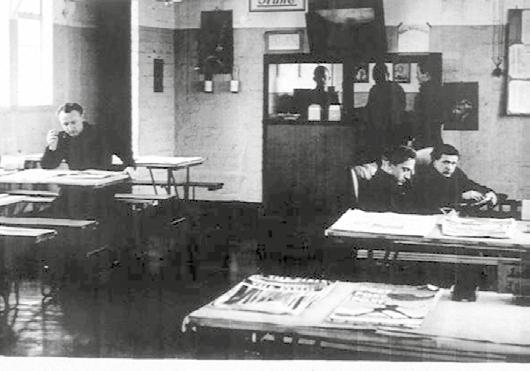
Remembering the Holocaust
Holocaust Memorial Day on January 27 is a national commemoration to remember those lost in the Holocaust, and the genocides in Cambodia, Rwanda, Bosnia and Darfur. This year, to commemorate Holocaust Memorial Day, we developed a programme of activities across all eight of our libraries. Our adult events were held in Falkirk and Denny libraries. This year marks the 75th anniversary of the liberation of Auschwitz-Birkenau. Many people do not realise that Falkirk had its own prisoner of war camp, Castle Rankine near Denny. To explore what Holocaust Memorial Day means to us, we invited Geoff Bailey, our Heritage Engagement Officer, to present a talk on the history of this camp. The talk was very popular with over 60 people attending with lots of questions on the night. We aim to digitise a version of this talk for future use. Falkirk Library also hosted a Holocaust Memorial Day commemoration in partnership with the Central Scotland Regional Equality Council. This event engaged with members of all major religions who came together to discuss and learn about genocides in Rwanda, Germany and Poland. We also held six school class visits to discuss evacuation and prisoner of war camps, and we asked children to consider what they would take in their suitcase if they were forced to flee their homes today to help them understand the impact of evacuation on children.
Thanks to Laura McCartney for her photgraph or her son Tom McCartney.
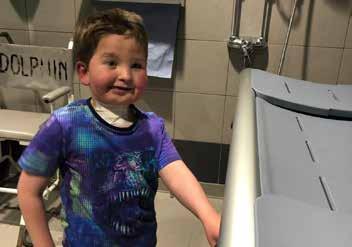
Introducing sensory sessions at Grangemouth
Recognising the diverse needs of visitors, our team at Grangemouth Sports Complex trialled a sensory session designed mainly around the needs of people on the autism spectrum. The sessions took place on alternate Saturdays between 5.30pm – 6.30pm. A key element of sensory sessions is ensuring quiet, calm conditions, not just in the pool itself, but in every aspect of the customer experience, from the entrance, through to the foyer and changing area. The early sessions attracted around ten people but word quickly spread and within two months the number of attendees regularly reached 20+. Participation was diverse, consisting of adults, couples and families with young children, with no discernible age range or condition dominating attendance. The common factor was appreciation of the opportunity to swim in a safe, controlled, relaxed and calm environment. The concept worked particularly well for families, allowing parents of young children to communicate more effectively with their children in the water without distracting noise or splashing from the general public. Feedback has been tremendously positive and the sessions are an important inclusive addition to the Grangemouth Sports Complex swimming timetable. In the latter sessions, not long before lockdown, staff received requests from a number of autistic customers to put the flumes on for the last 15 minutes of the session, which we were delighted to do! For more information about sensory sessions at Grangemouth Sports Complex visit our website www.falkirkcommunitytrust.org/whats-on/sensory-swimsessions/
Inclusion
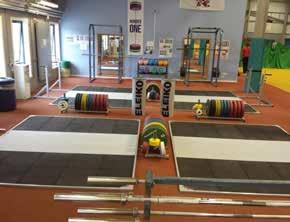
Supporting weightlifting star Giorgio Taliba
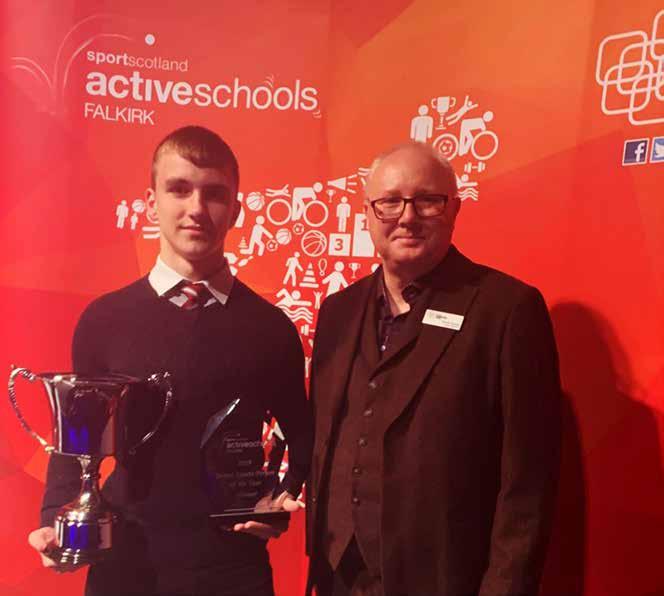
At the Active Schools Awards last year Giorgio Taliba won Junior Sportsperson of the Year. Our Active Schools team soon became aware that Giorgio was travelling outside of the Falkirk area to train which was not sustainable. We suggested that he apply for the Falkirk Community Trust Sports Performance Award, which provides international athletes living locally in the Falkirk area with free of charge access to train at our venues. Giorgio was awarded an elite athlete gym pass and has since been training at Grangemouth Stadium gym. This reignited his passion for the sport and a few months ago he became British Champion in the 73kg weight category, an incredible achievement! Giorgio has since gone on to break many records and win titles as well as being ranked #1 in Scotland and Britain in the 73kg category. We are so pleased that our Sports Performance Award has helped this remarkable 16 year old to continue his sporting career. Do you know someone who would benefit from the Sports Performance Award? Find out more about it here: www.falkirkcommunitytrust. org/sport/sportsperformance-awards/
Making our cultural venues accessible for all
We are proud that our cultural venues were the first in the UK to sign up to Neatebox Welcome, an app that improves interactions between customer service teams and people with disabilities by making staff aware of the specific needs of their visitors in advance of their arrival. What we liked about the Neatebox Welcome approach is that it raises the confidence of both visitors and staff and helps to build lasting relationships by allowing customers to comfortably alert staff to their individual needs. We are committed to being inclusive and welcoming to all our customers. As well as wheelchair friendly parking and accessible toilets, we offered British Sign Language (BSL) interpreted performances at our pantomime, Aladdin, and we have infrared You can download the Neatebox Welcome app from the App store / Google store
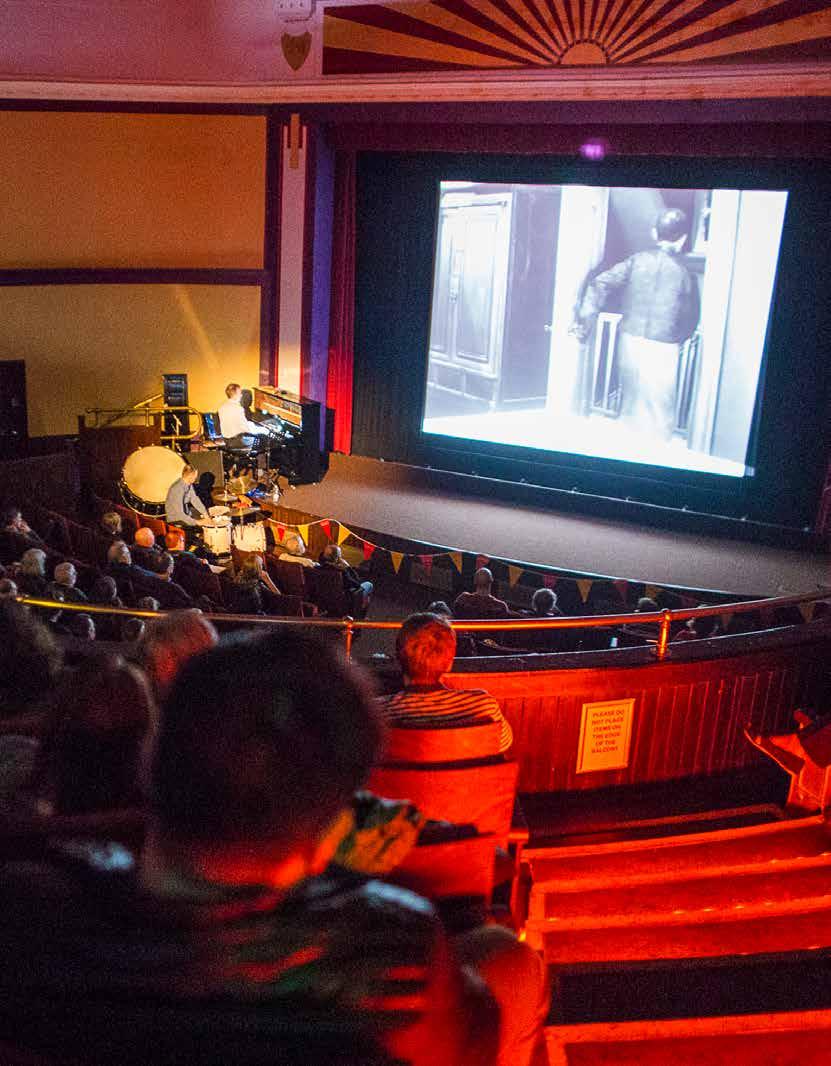
sound and induction loops at both FTH Theatre and the Hippodrome. Selected films at the Hippodrome are supplied to us with an Audio Description track on the digital file. Audio Description is a service for partially sighted or blind people, and for selected films a narration track is available which can be accessed through special headphones. This fills the gaps between dialogue by describing what is happening on screen and doesn’t affect other spectators’ experience. For customers who would like this service, AD headphones are available to collect from the Box Office. Additionally we also schedule regular Autism Friendly screenings at the Hippodrome.
Inclusion
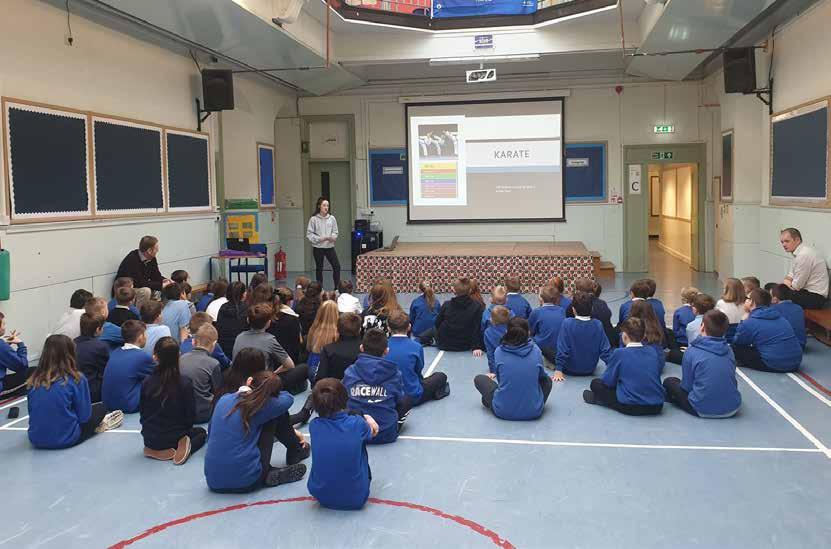
Inspiring Hope helps Grange Primary School
Falkirk Community Trust volunteer Hope Murphy shared her experiences of how sport can help mental health during an inspirational presentation given to Primary 4-7 pupils at Grange Primary School as part of Schools’ Health Week. Hope explained how sport helped her during a very difficult time in her life and she emphasised to the pupils that talking can help, and highlighted that it’s okay not to be okay. Hope said “Before my presentation I was very anxious as I had never given a full presentation to that many people before and I wasn’t sure if they would enjoy it or find me boring but once I started speaking I gradually felt better and better. After the presentation was over I was extremely proud of myself for standing up and presenting. I was also very happy knowing I had made an impact on the children listening and that they would hopefully take my story home and share it with other people!” The feedback from the school was fantastic with Mr MacWhirter, Head of PE, saying “Hope is an exceptional pupil. She has volunteered for us for a number of years and has coached many clubs. Her main talents lie in basketball but she has taught many other sports for us including dance and cheerleading. What is most impressive about Hope is that she has done this whilst battling mental health issues. Rather than hide these away Hope has chosen to speak openly and indeed use her experiences as a way to help others. Hope promotes the use of exercise and sport to help with her own mental health and she has spoken to many primary pupils about keeping physically active. Hope is an inspiration for us all and we are proud to have her as part of the Bo’ness Academy community.” Hope volunteers at our Sports Academy at Bo’ness and delivers extra-curricular clubs in the Bo’ness Cluster and also volunteers at the Sports Camps. She loves to coach and is building her experience and confidence in teaching sports to children. All of us at the Trust are immensely proud of Hope for sharing her personal experiences and for inspiring others with her passion for sport. If you are facing mental health challenges and would like advice or support, contact SAMH online at www.samh.org.uk or call 0344 800 0550.
We were so pleased to receive the following feedback from a Carrongrange High School teacher:
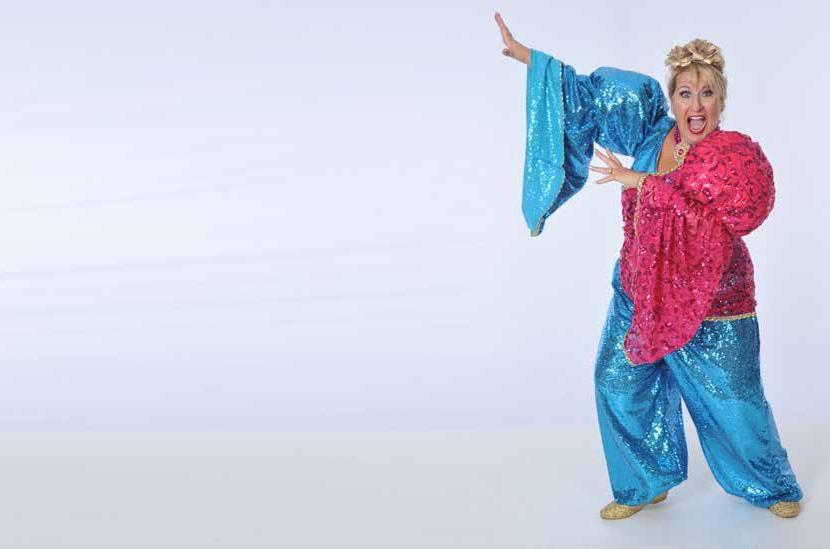
Prioritising access and inclusion across our cultural portfolio
We want everyone to be able to access our cultural services, and the Hippodrome Festival of Silent Cinema has blazed a trail in terms of increasing access for D/deaf and hard of hearing audiences through BSL and ENT (electronic-note taking) for events. While the 2020 festival was cancelled due to COVID-19, the achievements of last year’s festival were celebrated in 2019-20 both as a Parliamentary Motion (Motion S5M-17124) and through being a Finalist at the Scottish Sensory and Equality Awards 2019 in the category ‘Outstanding Practice, Innovation and Dedication to Sensory Loss and Inclusion’. We included BSL performances in the schedule for our 2019 pantomime, Aladdin, as well as a ‘relaxed performance’ for those audience members who have additional needs, and Carrongrange High School were one of the groups who attended. In a relaxed performance the delivery is adapted in a number of different ways. For example, we set up a ‘quiet room’ where audience members could watch a live stream of the pantomime if they preferred to avoid the immediateness of the actual live show. We worked with the pantomime producers to provide an information sheet that teachers and carers could work through with pupils to help them become fully aware of what to expect during their visit. We also Awards Achievement! hired a Pamiloo changing room and ensured that the delivery of the Finalist pantomime experience Scottish Sensory and was developed with Equality Awards 2019 this particular audience’s needs in mind.
Inclusion
Care Words: empowering people through stories
Care Words connects and empowers people who live in care homes through stories, memories and interactions with others. Funded by the National Lottery Community Fund and now in its second year, our Care Words volunteers lead reminiscence and reading groups that improve wellbeing, reduce isolation and stimulate conversation. Each Care Words visit is informed by the interests, engagement and emotions of the participants, which makes every session unique. Our volunteers take a personcentred approach, responding directly to the resident’s health, wellbeing and emotional state. In 2019-2020 our volunteers ran 140 Care Words sessions, reaching 173 new residents across fourteen care homes. We’ve also launched a pilot project at Albany Court, an independent living centre. We are hoping to recruit more skilled volunteers and extend our reach to other care homes across the wider Falkirk area, and we would also like to trial the Care Words project at two hospitals and in the community space at the flats beside Callendar Park. Having the opportunity to test our approach in different settings, and carrying out the necessary changes to make the project work in these environments, will help us provide benefits to more vulnerable older people. One of the care homes is planning to purchase tablets for their residents and has discussed with us running IT sessions as part of the Care Words project. Teaching basic skills in this area would support the residents to become more confident in their abilities with technology. The COVID-19 crisis has highlighted the importance of being connected digitally and how it can be a powerful way to combat loneliness. Improving mood and wellbeing
Music and song can lift our residents’ spirits and improve their mood. Our volunteers have created MP3 playlists of a wide selection of music genres, and have created a Scottish Songbook and Sing-along Songbook to encourage people to participate. Even knowing the chorus or hook of a song lets people join in and raises their spirits.
“Mrs J has no speech and is very frail, but she is very animated and watches everything that is going on. One day when we visited we noticed she wasn’t her usual self, and was curled up in her chair avoiding eye contact. As the session progressed with music and song she unfurled, looked towards us and started to smile. By the end of the session, she was mouthing the words of the songs and tapping her feet to the beat of the music, it was wonderful to see.”
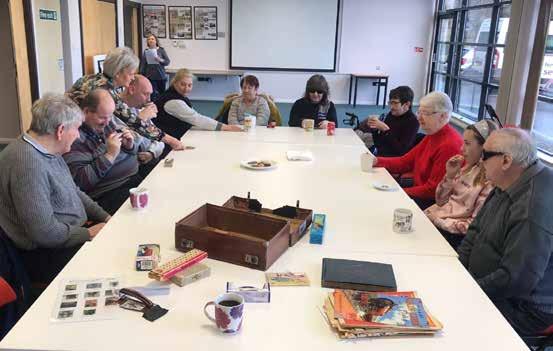
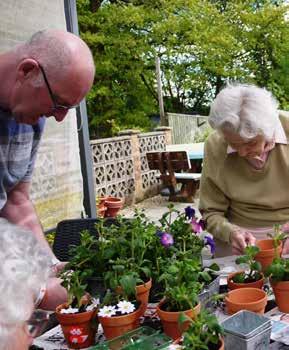
Helping to encourage conversation
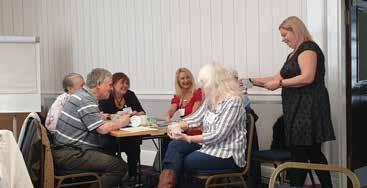
Reducing isolation and loneliness
People respond differently Not everyone has family to different stimuli, which nearby to visit, and is why we’ve developed Care Words enables multi-sensory approaches residents to open up to encourage responses about the loneliness they and engagement. Our sometimes feel. Having volunteers use various a familiar face and voice tools and skills to can be a real comfort encourage everyone to and our volunteers see take part. Mentioning this when they smile, residents by name and wave or recognise us asking direct questions from previous visits. helps support them to Our sessions also bring contribute while touch is people who perhaps live essential for those with in different units or wings severe ill health issues, together with others they by using tactile objects may not socialise with on our volunteers encourage a day-to-day basis. residents to respond and “One of the residents engage. we visit, Mrs C, often “Mr B has latter-stage confides in us that she Parkinson’s disease and is bored and lonely. although he attends the She doesn’t have sessions regularly we many visitors and she have found it difficult to struggles to engage encourage him to speak. intellectually with others, One day he was holding mainly due to the health a small soft toy dog while and capacity issues of we were discussing other residents. When wildlife and animals. Out we visit she laughs and of the blue he started to talks excitedly, she is tell us about his own pet empowered to lead dog and spoke at great the group discussions length about his beloved and encourages others spaniel, opening around her to up for the very participate.” first time.” Awards Achievement! Finalist Community Impact Award Community Leisure UK 2020 Awards
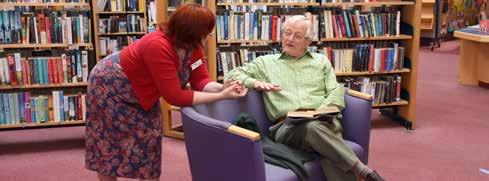
Enabling and empowering people
Whether reciting poetry, singing or telling a personal story, enabling people to contribute is paramount during our sessions, and our volunteers respond directly to the information shared by residents during the session. That means we can go off on a tangent and onto a different subject for a while, but as long as the resident is listened to and engaged with, that is what matters. Giving people a platform and supporting them to participate in the way they want tends to make people more animated and happier, which we can see by their body language. “Mrs B attends a day group at Alzheimer Scotland. She loves music and dance and we have encouraged her to dance with us during the sessions. On one occasion, while delivering a springthemed session, Mrs R astounded everyone by reciting a poem by William Wordsworth - word perfect - for the group. She had learned the poem at school, and we made such a fuss of her for giving this performance that it left her beaming with pride and smiling.”
Noticing stimulation and engagement
During the Care Words training, we encourage watching for the little changes which can indicate massive differences in the behaviour of individuals. Actively noticing is important as it can help volunteers gauge whether the sessions are reaching people who have challenging health conditions. “Mrs L was a librarian and has extensive health issues with very little verbal communication. In most sessions she showed little evidence of participation, remaining still with her head bowed. Due to our volunteer training we noticed during one session that she was mouthing the words to a poem we were reading out. Noticing, and responding to subtle engagement like this is an important part of what we do.” “A wee word of thanks to the care words volunteers for their continued participation and support to make the project successful in that space instead. I couldnt do it without them!” Claire Davis, Care Words Manager If you would like to learn more about Care Words, or perhaps train as a volunteer, please contact us on www. falkirkcommunitytrust.org/getinvolved/volunteering/
Inclusion

Digital Storytelling
Statistics show more than one in five adults in Scotland lack basic digital skills, often due to barriers such as poverty, lack of educational qualifications, disability and age. The People’s Story Project focused on working with those who were not digitally confident, to introduce them to online culture in a way that built skills and emphasised the personal relevance of IT for them. Digital storytelling is an approach that involves using iPads and selected apps to create images and audio, which are then edited together by participants to create a short film about themselves or an incident in their lives. The project was a joint partnership between the Scottish Book Trust and Falkirk Community Trust libraries, funded by the Scottish Government. The funding covered the employment of a Digital Storyteller, Sabine Hellmann, the purchase of IT equipment, and two celebration screenings at the end of the project held in FTH Theatre and the Hippodrome. Sabine held workshops to help participants find and use their own voice; working with individuals in a group setting to develop their confidence using digital technology while at the same time, developing their communication, social and literacy skills. Most importantly, participants were able to create digital stories about their own personal experiences, and discover technology in a fun and meaningful way. Digital Storytelling
Falkirk Writer’s Group member Douglas editing his story
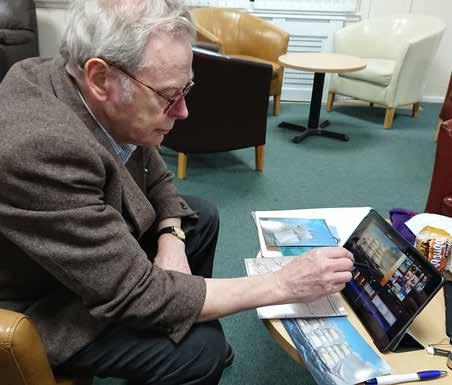
Sabine worked with a wide range of different groups, including visually impaired participants, children leaving care, refugee groups, volunteers, mental health groups and local heritage organisations. The People’s Story Project delivered more than 50 workshops to over 80 participants, and over 65 stories are now available to watch online at www.digital-stories.scot. These compelling stories demonstrate just how empowering and effective it is to give people the chance to tell their own stories through relatively simple digital apps.
Sabine Hellmann
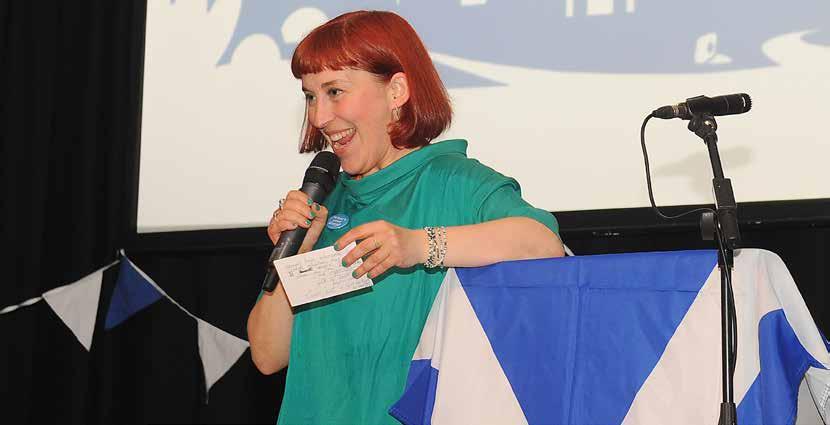
The project was also supported by Vikki Ring and the wider library staff team. Our library staff have embraced Sabine’s digital storytelling training, and a newly trained staff member is now incorporating digital storytelling into her delivery of the Care Words project. Additionally, many community group facilitators and leaders have attended training sessions with Sabine. The legacies of the project are many. Trained staff and community group leaders are able to borrow the IT equipment to use these powerful techniques in other groups and projects. We hope this will lead to other isolated and digitally-excluded people being able to engage with this technology. The most important legacy is of course the stories themselves. The project has created a wonderful digital story resource that is available to explore online. “It has been an absolute pleasure working with all the wonderful participants from different walks of life in the Falkirk area! I’ve learned a great deal about local history, astonishing achievements and life’s challenges. The best parts of the project were the moments when stories were shared and connections made, when there was not a dry eye and very proud storytellers. I hope lots more stories will emerge and I hope the skills gained will help participants on their journey using more digital technology!” “More stories will emerge and I hope the skills gained will help participants on their journey using more digital technology!” Sabine Hellmann, Digital Storyteller. Sabine Hellmann, Digital Storyteller A staff training session
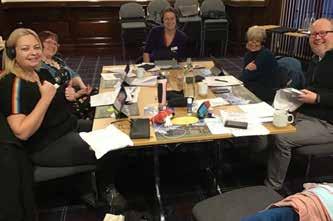
Uatandua (from Falkirk Sewing/Quilting group) recording her story into the iPad
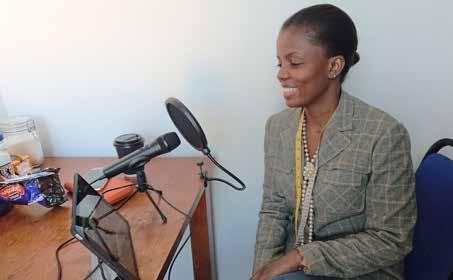
Inclusion
Case Study: Our Local War Hero
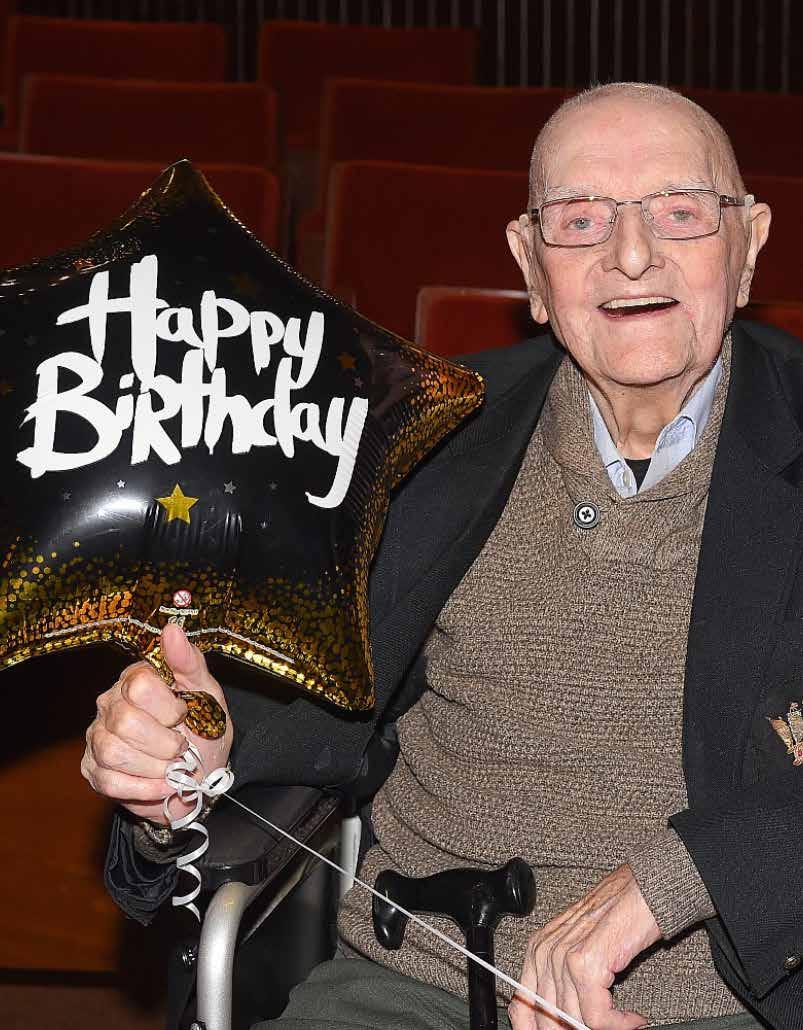
Our projects become even more impactful when they work together. We trained some of our Care Words volunteers in digital storytelling, and those skills have been hugely valuable in supporting care home residents to share their stories and experiences. Mr Austin Howes, a gentleman residing in one of the care homes we visit, was feeling very isolated and lonely, in particular he was unable to engage effectively with other residents due to the nature of their health issues. While getting to know him, our volunteers discovered that he had the most fascinating life story which he was keen to share, in particular his experiences of serving in the Navy during World War II. So, we started recording his memoirs as part of People’s Story Project. On the eve of his 99th birthday we supported Mr Howes in attending the final project event at the Hippodrome where his story was screened as the big finale. Many audience members approached him afterwards and showed their appreciation of his bravery and courageous efforts during the war, calling him a hero. This feedback and experience has had a hugely beneficial impact on Mr Howes, boosting his self-esteem. Discovering that people are interested in what he has to say has given Mr Howes a new sense of purpose, helping him feel valued and appreciated. We have
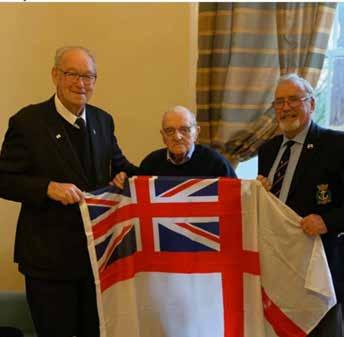
noticed his overall outlook and demeanour is much more positive and we know he really looks forward to our visits, referring to us as his “new friends.” We are continuing to work with Mr Howes to record and compile the rest of his life story. Involving Mr Howes in both Care Words and the People’s Story Project had a positive impact for his health and mental wellbeing, and has been a catalyst for the increased recognition this war hero clearly deserves in his local community.
Uncovering Hidden Heritage at Kinneil Estate
The historic parkland of Kinneil Estate is an important recreational space for the community of Bo’ness and a fantastic heritage asset for the region. In 2015 we co-ordinated a partnership planning approach for the Estate, resulting in the publication of a Masterplan containing a range of exciting development projects. One of these is the Hidden Heritage project, funded by The European Agricultural Fund for Rural Development: Europe Investing in rural areas, through LEADER Kelvin Valley and Falkirk LAG, our Great Place project and the Friends of Kinneil, with the Trust providing in-kind support in the form of staffing. The project got off to a strong start in May 2019 when a group of volunteers started researching less well-known aspects of the story of the Estate. The findings of that research have been used to create five interpretive panels which will be installed on site, adding a rich narrative to the visitor experience. The group also worked with a landscape architect to develop a design for a Discovery Trail, informed by feedback from the community about how play can help local families engage with their local heritage. The finished Discovery Trail design was showcased to the public via our social media channels in May 2020 and we will now begin fundraising to deliver the Discovery Trail on site.
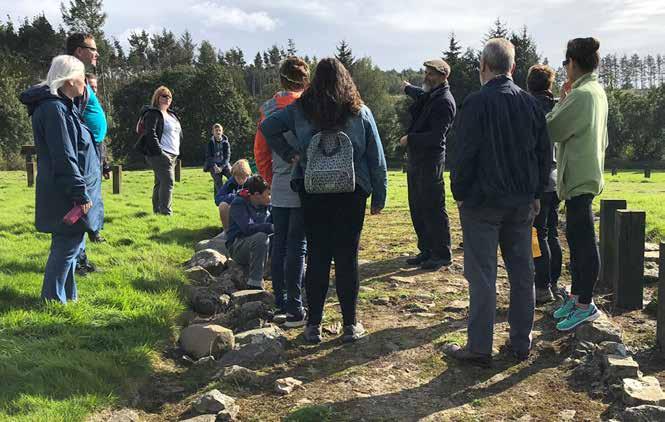
The benefits of the project have been impressive: the visitor experience has been enhanced, volunteers have developed new skills and formed social connections while local people have learned more about the history of their local park. New partnerships have been forged and we look forward to them growing stronger as we move into the next exciting phase of the project. The Trust is proud to act as facilitators, helping communities be part of the change they want to see in their local area.
Get Involved!
The Hidden Heritage group at Kinneil Estate is looking for new volunteers to join them for the next stage of the project, designing a play trail for the park. Volunteers will work with a professional consultant to design a play trail for the site which relates to the fascinating heritage of the park. For more information about joining the Hidden Heritage volunteer group, contact parks@falkirkcommunitytrust.org
Inclusion
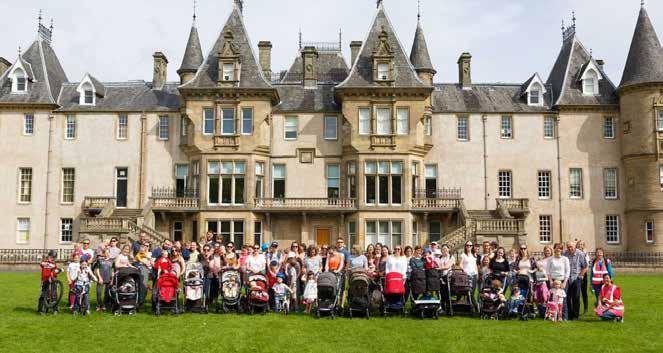
The Step Forth walking for health programme, which aims to get the population of Falkirk more active, continues to go from strength to strength and is now into its 16th year! Building upon Falkirk’s recognition as the ‘Best UK Walking Neighbourhood’ awarded by The Ramblers in 2019, we have 26 volunteer led walks per week running from Monday to Saturday come rain or shine. These include health walks, buggy walks and Nordic walking, all of which have been recognised by the World Health Organisation as good practice. Our Active Forth physical activity referral programme is designed specifically for people diagnosed with a range of medical conditions. Customers referred in this way have the opportunity of a personalised gym programme and classes such as Otago, Strength & Balance, Circuits, Aqua Gym and Spinning at our four health and fitness clubs. We work very closely with NHS Forth Valley and we have had more than 1,500 referrals since January 2019. Our philosophy is that if our referral instructors and volunteers provide a meaningful and positive experience, then the people referred are more likely to stay active. By working this way our programme has experienced a significant increase in use, achieves a high completion rate and has been advocated strongly by the health professionals that refer into it. In fact, our referral programme was recently recognised
Awards Achievement! Finalist Community Impact Award Community Leisure UK
Active Forth and Step Forth go forth!
2020 Awards as having best practice in Scotland and we were selected to present to practitioners, policy makers and academics at the Scottish Physical Activity Research Conference! The key to the programme’s success is the partnership working we undertake with local health professionals. We have been involved in NHS Create sessions where we have presented to practice managers, GPs, physios, community nurses and pharmacists on how they can support patients to be more physically active. This partnership approach led directly to a new Falkirk Physical Activity Steering Group being created. We entered this year’s Community Leisure UK Awards and were delighted to be selected as a finalist for The Community Impact Award, for our successful Active Forth Referral programme. Unfortunately on this occasion we didn’t win the award however it’s a fantastic achievement to be recognised across the UK as a finalist. Both the Active Forth and Step Forth programmes are largely self-sustaining, with customers covering the subsidised membership, which has allowed us to re-invest into our programme and Step Forth is continuing to attract new volunteers to lead walks. For more information on the Active Forth and Step Forth programmes visit www.falkirkcommunitytrust. org/fit-and-active/active-forth/
Exploring the sounds of music
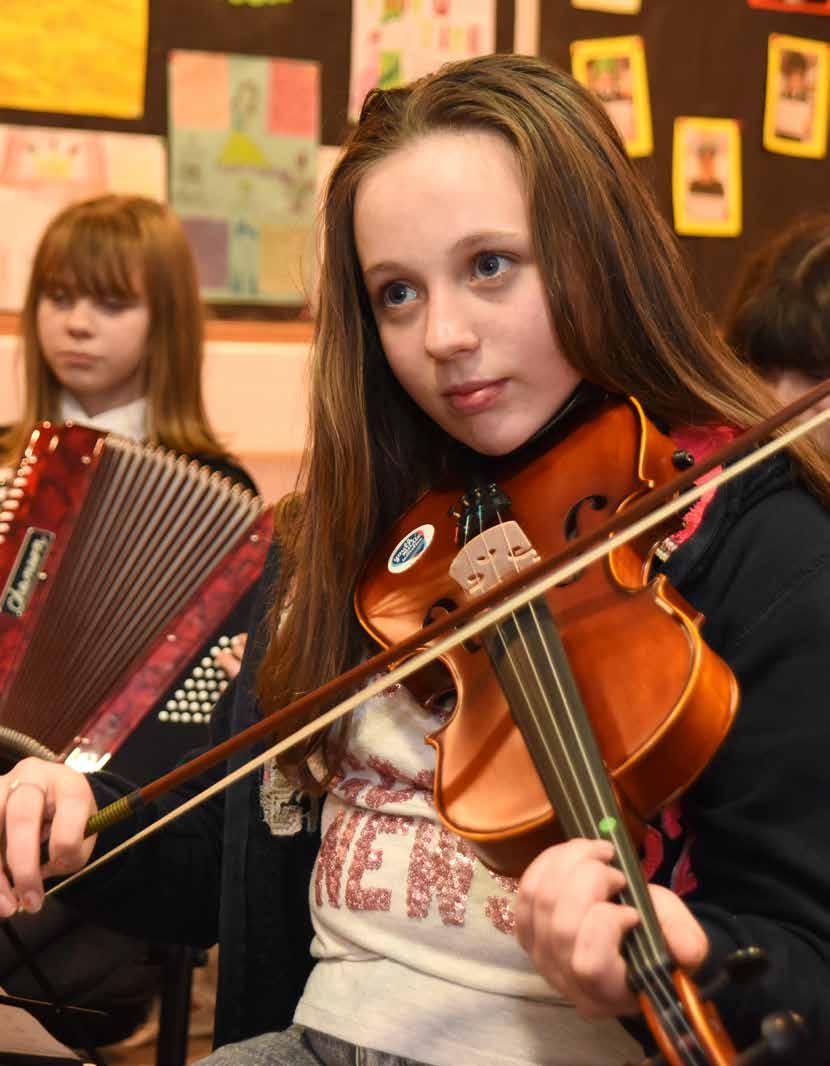
Now in its 17th year, our Youth Music Initiative (YMI) programme continues to engage and inspire children and young people in music activity linked to the Curriculum for Excellence. The initiative is funded by Creative Scotland, delivered by Falkirk Community Trust in partnership with Falkirk Council Children’s Services, and is led by a team of musicians who work across all the school clusters in the area. In the last year our YMI programmes reached over 5,000 pupils with the programme making musical activity available for all nurseries and primary schools. The initiative is supplemented by two additional programmes. The Trad Project encourages children and young people to experience traditional music by providing free instrument and ensemble playing in a range of traditional instruments, while Tune-in works with children and young people in the Additional Support Needs and Enhanced Provision wings of schools, as well as the Mariner Support Service, Oxgang School and Carrongrange High School. Drawing on our delivery experience, in February 2020 we launched our Trad Project for children and young people with additional support needs. This followed on from consultation with schools, pupils and their parents, and with funding support from the Scottish Music Centre. We look forward to seeing it develop further, enabling a wider range of young people to benefit from the enriching experience of engaging with traditional music.








